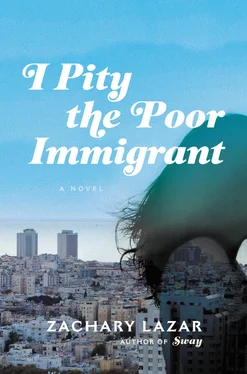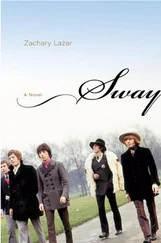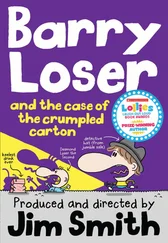“Jews are murdered here all the time,” he said. “The world doesn’t really like to remember that, but that might be why the IDF said what it said.”
He looked away as if scanning the traffic, his hands and forearms resting on the table. What I felt then was different from the mild shaming I’d felt from the El Al screeners at the airport. Until I got my bearings, I felt that I could not do this story, that I was not equipped for it, intellectually or otherwise. I went over the various scenarios. That Bellen had been murdered by extremist Jews who hated his book’s sacrilegious treatment of the David story. That he had been murdered by Palestinians, perhaps simply at random, perhaps because of his relative notoriety. Both scenarios seemed unlikely. There was another theory, only hinted at, that I’d found in an interview given by Bellen’s editor, Galit Levy. Levy declared that the murder could not be understood without answering the simple question of how someone could be run over by a truck as many as twelve times in a densely populated district like Beit Sahour without attracting any witnesses. I assumed she was implying the presence in Beit Sahour of a militia group or some type of organized crime.
“Those are some of the possibilities people come up with,” Voss said when I asked his opinion.
“But no one believes them.”
He shrugged one shoulder and let out a disgusted breath. “Believe. Not believe. What are the facts?”
6) NOT FUNNY
Around this time, I happened to watch the Pacino remake of Scarface. It’s not a good movie. It’s a bad movie, but it resonates — it resonates all across the globe. And I thought, why am I so bored with poetry? In the movie, once Tony Montana kills his way to the top, he has not even one second of happiness. A montage set to cheap music, then it’s coke addiction, bad sex, doom. I thought, that’s David, his whole rise and fall. That’s it.
— David Bellen, 2008
In America, Jewish writers are frequently, sometimes compulsively, funny. The writing of David Bellen started to make me think this was problematic. Kid Bethlehem is a cubist jumble of short numbered sections. In addition to poems, there are quotations, scraps of memoir, reportage, scripture, newspaper clippings. The book, particularly in light of Bellen’s violent death, has made the world look even more fragmented to me now, more disjointed, shattered by some profound if intangible trauma. I have found myself imitating its form and tone in this essay you’re reading now.
Kid Bethlehem
Trouble from the minute he left his sheep
and that rocky place
threatened by the lion and the bear
to soothe King Saul with his harp,
then kill Goliath with a small hard stone
A stone killer—
it was all the women talked about, so Saul
needed him hit
The war advanced on all fronts
Who knows
why any of this had to happen?
Warsaw, Lodz, Auschwitz, Babi Yar,
Murder Inc., Beirut
The rockets arcing toward Tel Aviv
As in days of old
before
the coming of
the King David Hotel
They said God was dead, but God is not
God is the small hard stone
in the boy’s sling
7) THE VALLEY OF ELAH
After our lunch that day, Voss went with me on what I thought might be a fool’s errand: one of my guidebooks indicated that somewhere near the junction of Route 38 and Route 383 was a hill, or tel , called Azeka, which looked down on the Valley of Elah, where David had killed Goliath.
We drove once again along the separation wall — Jewish settlements on one hillside, Arab settlements on the opposite ones, just as three thousand years ago it had been Israelites and Philistines. It was such an obvious parallel that I was embarrassed even to be thinking about it, sitting next to Voss in the Mercedes taxi. He wore a dark blue shirt, unbuttoned at the neck, and a black suit. While we drove, he solemnly checked his BlackBerry and made a few phone calls in Hebrew, a language I can read phonetically but I don’t speak.
Far outside Jerusalem, we entered a region of large farms and pine-covered mountains. The clouds thickened until the hillsides, with their undulating smooth stones and sparse bushes, looked uncannily biblical. We were lost. The driver pulled over and he and Voss had a conversation in Hebrew while they looked at the driver’s enormous folding map. I finally suggested that we ask the boy who was waiting at a rural bus stop just up the road. We drove there. The boy turned out to be a recent immigrant from Manchester, England. He wore surfer’s shorts and a white button-down shirt and a skullcap of multicolored yarn. I explained in English what we were trying to find, and he knew exactly what I was talking about. He leaned in the window and gave Voss and the driver precise directions in Hebrew.
“Lots of Brits coming into this area,” Voss grunted. “More true believers. Another wave.”
The road dead-ended at the top of the hill, so Voss and I got out of the car and continued up on foot. It was a steep rocky path and when I slipped a little, looking down at my camera, Voss caught me lightly by the arm. He did this out of simple instinct, but he was a little ceremonious about making sure I’d regained my balance. He was handsome and everything about his movements was imbued with the habits of handsomeness.
“A beautiful view,” he said at the top of the hill. “I guess you’ll expense the ride.”
“Not likely. Not for a story about a dead Israeli poet.”
The dry grass and weeds below us — gold, gray, brown, mustard — began to blaze up in their colors as the sun emerged through the clouds. I pictured the boy David running out in sandals, arms stabbing the air, a slingshot in his hand.
“It could have been a suicide,” Voss said. “Bellen’s death. That’s what I sometimes think.”
8) CITADEL
My first glimpse of the Old City of Jerusalem came after a picturesque climb up the western slope on a dirt path through pines and flowering shrubs. I took a chance right turn into the fortified wall and found myself in a silent alley of stone — stone steps, stone walls, all of it swelling with a gold light unlike anything I’d ever seen. The sky above it was cloudless and thickly blue. Because there were no people there — because it happened to be empty — the alley appeared timeless, the stairway a mystical symbol. I walked up the alley to the Zion Gate into an exotic place far more beautiful and seductive than I had expected. I had to come to terms with the powerful fact that Israel is physically beautiful. The name is beautiful — not just the sound, which is sonorous, but the meaning: “one who wrestles with God.” The idea of a people naming themselves that way is beautiful. I had to try hard not to be seduced. The stairs and the fortified walls were replicas of stairs and fortified walls from hundreds of years ago. The city itself was thousands of years older than those earlier stairs and fortified walls. When David first conquered Jerusalem and established his capital there, it had belonged to a forgotten people called the Jebusites, about whom we know nothing. I had to remember that the people who lived there now were as distant from the people who had built the original city as I was.
9) THE VIEW FROM THE HILL
A suicide. I tried to think my way through this statement as we stood there on top of Tel Azeka. The more I thought about it the more it seemed that Voss was making some kind of absurdist joke. We were walking down the other side of the hill now toward the dry creek bed near the highway, the creek bed where three thousand years ago David had chosen the stone for his slingshot. Everything below was green and beige — the farm fields in the valley, the pines and the cedars — but the landscape was fixed in the present by the road and the industrial-style planting of the crops. Voss began to elaborate, after I prodded him. Imagine you were sixty-five years old, he said, with a history of depression and your life’s work once again about to reveal itself as virtually irrelevant. The cease-fire with Hamas had just ended, the Gaza War was imminent, your most recent book of poems — a prize-winning book you had spent five years writing — had sold just a thousand copies, received a mixture of respectful and hostile reviews, and within a few months was all but forgotten except by some fanatics who hadn’t actually read it. He said that he himself had experienced severe depressions in the past, periods of weeks or even months when the pointlessness of his work, or a guilty memory, or the sense that the world was winding down — all these forms of despair that sound so frivolous when you’re on the other side of them — became constant and fixed. He would see very clearly how little difference it made if he lived or died. In that disturbed state of mind, the only thing that kept Voss from killing himself, he said, was the thought of his family and friends, and how much it would sadden them. He said that if he’d been able to imagine a way to disguise the suicide as an accident or a murder, we might not be taking this walk right now.
Читать дальше












